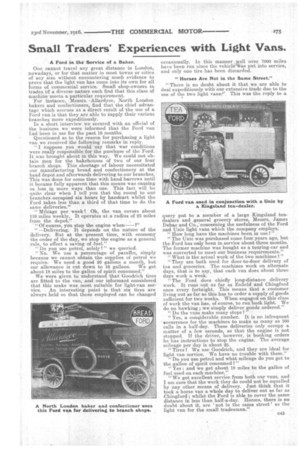Small Traders' Experiences with Light Vans.
Page 13

If you've noticed an error in this article please click here to report it so we can fix it.
A Ford in the Service of a Baker.
One cannot travel any great distance in London, nowadays, or for that matter in most towns or cities of any size without encountering much evidence to prove that the light van has come into its own for all forms of commercial service. Small shop-owners in trades of a diverse nature each find that this class of machine -meets a particular requirement.
For instance, Messrs. • Allardyce, North London bakers and confectioners, find that the chief advantage which accrues as a direct result of the use of a Ford van is that they are able to Supply their various branches more expeditiously. In a short interview we secured with an official of the business we were informed that the Ford van had been in use for the past 16 months. Questioned as to the reason for purchasing a light van we received the following remarks in reply. "I suppose you would say that war conditions were really responsible for the purchase of the Ford. It was brought about in this way. We could not obtain men for the bakehouses of two of our four branch shops. This shortage of labour necessitated our manufacturing bread and confectionery at the head depot and afterwards delivering to our branches. This was done for some time with hand barrows until it became fully apparent that this means was causing us loss in more ways than one. This fact will be quite clear when I tell you that the round to our branches occupied six hours by handcart whilst the Ford takes less than a third of that time to do the same deliveries."
Mileage per week ? Oh, the van covers about 110 miles weekly. It operates at a radius of 25 miles frpm the depot."
" Of course, you stop the engine when—?"
"—Delivering. It depends on the nature of the delivery. But at the present time, with economy the order of the day., we stop the engine as a general rule, to eftect a saving of fuel."
"Do you use petrol, solely ?" we queried. "No. We use a percentage of paraffin, simply because we cannot obtain the supplies of petrol we require. We need a good 26 gallons a month, but our allowance is cut down to 16 gallons. We get about 18 miles to the gallon of spirit consumed." We were given to understand that Goodrich tires are fitted to the van, and our informant considered that this make was most suitable for light-van service. An interesting point is that six tires are always held so that those employed can be changed occasionally. In this manner well over 7000 miles have been run since the vehicIeltras put into service, and only one tire has been discarded.
"Horses Are Not in the Same Street."
"There is no doubt about it that we are able to deal expeditiously with our extensive trade due to the use of the two light vans?' This was the reply to a query put to a member of a large Kingsland teadealers and general grocery stores, Messrs. James Debac and Co.,*concerning the usefulness of the Ford and Unic light vans which the company employs. "How long have the machines been in use ? ' "The Unic was purchased some four years ago, but the Ford has only been in service about three months. The former machine was bought as a touring-car and was converted to meet our business requirements." "What is the actual work of the two machines?"
"They are both used for door-to-door delivery of tea and groceries. The machines work on alternate days, that is to say, that each van does about three days work a week. "The Ford does chiefly long-distance delivery work. It runs out as far as Enfield and Chingford once every fortnight. This means that a customer living out as far as this has to order a supply of goods sufficient for two weeks. When engaged on this class of work the van has, of course, to run back light. We do no hawking ; we simply deliver goods ordered."
"Do the vans make many stops ? "Yes, a considerable number. It is no infrequent occurrence for the machines to make as many as 100 calls in a half-day. These deliveries only occupy a matter of a few seconds, so that the engine is not stopped. If the driver, however, is booking orders he has instructions to stop the engine. The average mileage per day is about 25. " Tires ? We use Goodrich, and they are ideal for light van service. We have no trouble with them." Do you use petrol and what mileage do you get to the gallon of spirit consumed?" " )(es : and we get about 18 miles to the gallon of fuel used on each machine."
"We get excellent service from both our vans, and I am sure that the work they do could not be equalled by any other means of delivery. Just think that it took a horse van a whole day to deliver out as far as Chingford ; whilst the Ford is able to cover the same distance in less than half-a-day. Horses, there is no doubt about it, are 'not in the same street' as the light van for the small tradesman."
























